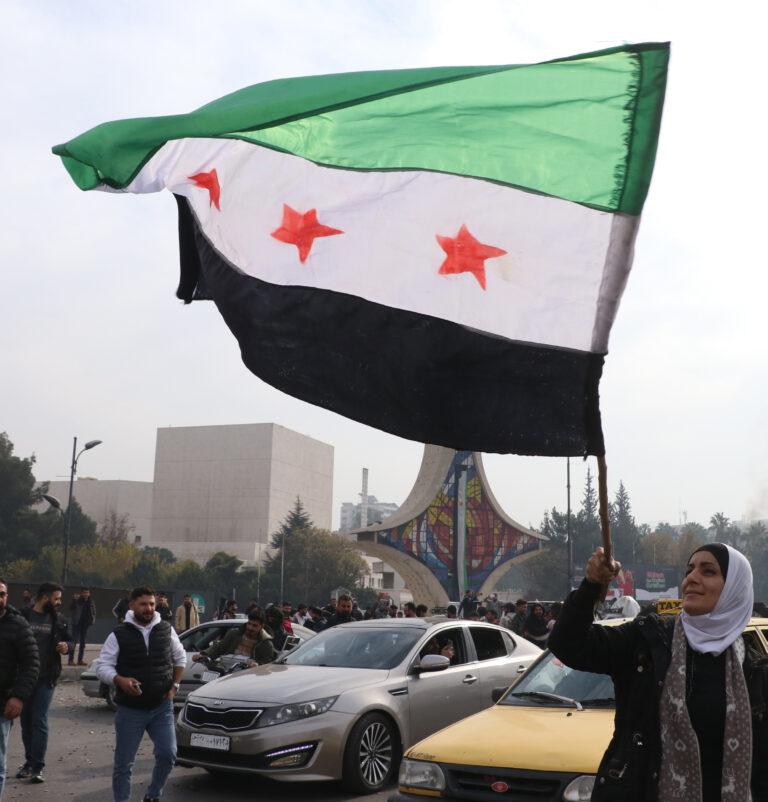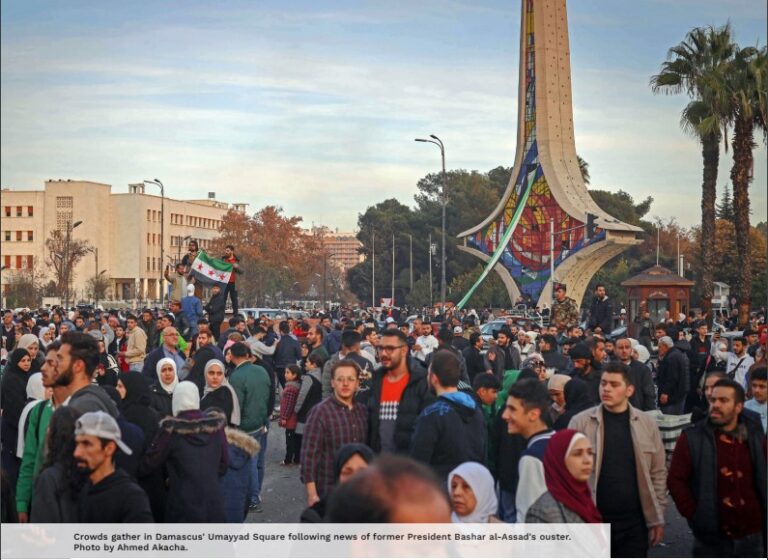Syria Update Digest
On 13 January, the Higher Regional Court in Koblenz, Germany sentenced Anwar Raslan, a former colonel at Syria’s notorious State Security Branch, to life in prison. It is the first prosecution anywhere for war crimes committed during the conflict in Syria and the most notable step to date in the ongoing pursuit of accountability and justice for such events. Nevertheless, while some Syrians have celebrated the verdict, to others, it highlights the lack of a comprehensive strategy toward justice in Syria. Justice and accountability measures are increasingly important to Syrians seeking redress for the events of the past decade. Despite their slow progress to date, accountability efforts outside Syria are seemingly gaining momentum.
- On 20 January, IS militants broke out of al-Sina’a Prison in Al-Hasakeh city following a car bombing by the group. The jailbreak reflects the IS’s need for manpower, and stands as a reminder that its affiliates are as ambitious as ever, and risks to implementers persist.
- On 19 January, three Syrian children died due to winter weather-related conditions in northern Syria. Despite aid programmers’ focus on winterisation, displaced Syrians continue to suffer for want of sustainable, long-term solutions to their plight.
- On 18 January, the Russian military police and Syrian Government forces conducted their first joint military patrol in the port of Lattakia. The deployment of Russian troops will impinge Iran’s military activities and deter Israeli strikes.
- On 17 January, protests over acute food shortages and price gouging in Al-Hasakah city were violently dispersed. The shortages stem from the closure of the Fishkhabour-Semalka border crossing, which may have significant implications for the humanitarian situation in northeast Syria.
- On 17 January, the Jordanian Army announced a security escalation on the Syria-Jordan border following the deaths of two officers in clashes with smugglers. Border violence, driven in part by drug activity, has increased, and tighter enforcement is likely to spark further clashes.
- On 15 January, an Israeli TV report claimed that the US and Russia had brokered a secret deal stipulating that Israel would supply Lebanon with gas via Jordan and Syria. The deal, which was denied by both Lebanon and the US, would speak to changing US priorities in the Levant and a shift away from sanctions maximalism.
- On 17 January, the leader of the main Turkish opposition party reiterated his party’s plan to return Syrian refugees to Syria if they win the 2023 presidential elections. The plan reflects growing hostility toward refugees amid volatile economic conditions.
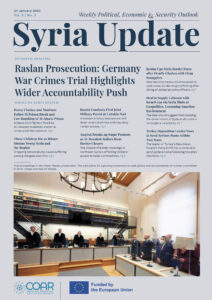
In-Depth Analysis
On 13 January, the Higher Regional Court in Koblenz, Germany sentenced Anwar Raslan, a former colonel at Syria’s notorious State Security Branch, to life in prison. It is the first prosecution anywhere for war crimes committed during the conflict in Syria. Raslan was found guilty of crimes against humanity committed while presiding over the Investigations Department at the detention facility Syrians know as “Branch 251”. Raslan was linked to some 4,000 cases of torture, 27 murders, and numerous cases of assault, rape, and sexual abuse.
The prosecution is the most notable step to date in the ongoing pursuit of accountability and justice for the events of the conflict in Syria. Donor agencies and civil society, particularly in Europe, are increasingly contemplating support for such initiatives, but their embrace of accountability has not been seamless. More can be done to square these efforts with the expectations of Syrians, and aid actors working inside Syria can do more to ensure their actions further principles of justice and accountability in wider-reaching programming portfolios.
A wider dragnet
Controversy has dogged the Koblenz trials since they were launched in April 2020. While some Syrians have celebrated the verdict, to others, it highlights the lack of a comprehensive strategy toward justice in Syria. Various Syrian human rights and civil society organisations have construed the trial and its outcome as a victory and first steps toward “a more comprehensive justice”. Raslan, head of the interrogations department conducting torture, stated in court that he had no power to stop the torture of detainees under his command.
Raslan’s case is a watershed moment in legal accountability for war crimes in Syria, but cases are already proceeding independently elsewhere over the actions of Syria’s expansive security apparatus. For instance, in February 2021, a sergeant who also worked at Branch 251 was sent to prison for 4 1/2 years after he was found guilty by the same court of rounding up civilians to be tortured, disappeared, and murdered. On 19 January 2022, a trial began in Germany in the case of a Syrian doctor accused of crimes against humanity committed while working at two military hospitals in Homs. Cases are also being investigated in Sweden, France, the UK, and other Western countries. The Center for International Justice and Accountability (CIJA), which has provided assistance with records related to crimes in Syria, has reportedly received requests for documentary information in relation to 1,600 cases.
Piecemeal justice
There is more donor governments can do to support Syrian-led initiatives that aim to achieve accountability and restorative justice objectives. Donors should ensure their programmatic support tracks with the priorities of Syrian civil society organisations, many of which hold to an outsized focus on transitional justice objectives. Matching actions to expectations will remain a challenge, though. In some priority areas, including issues related to detainees and the missing, progress will be all but impossible without Government of Syria cooperation. Abroad, donors have been keen supporters of organisations carrying out or supporting investigations into crimes committed in Syria, including the gathering of information and witness testimony. Stronger duty of care procedures should be embraced and prioritised, particularly given the risk of intimidation and threats by allies of Damascus, even abroad. Syrians who speak up abroad may risk the safety of relatives inside Syria. Aid implementers working on the ground have a role to play too. Implementers must ensure that project design accounts for housing, land, and property violations, which are an important and practical area of concern. Justice and accountability measures are increasingly important to Syrians seeking redress for the events of the past decade. Despite their slow progress to date, accountability efforts outside Syria are seemingly gaining momentum.
Whole of Syria Review
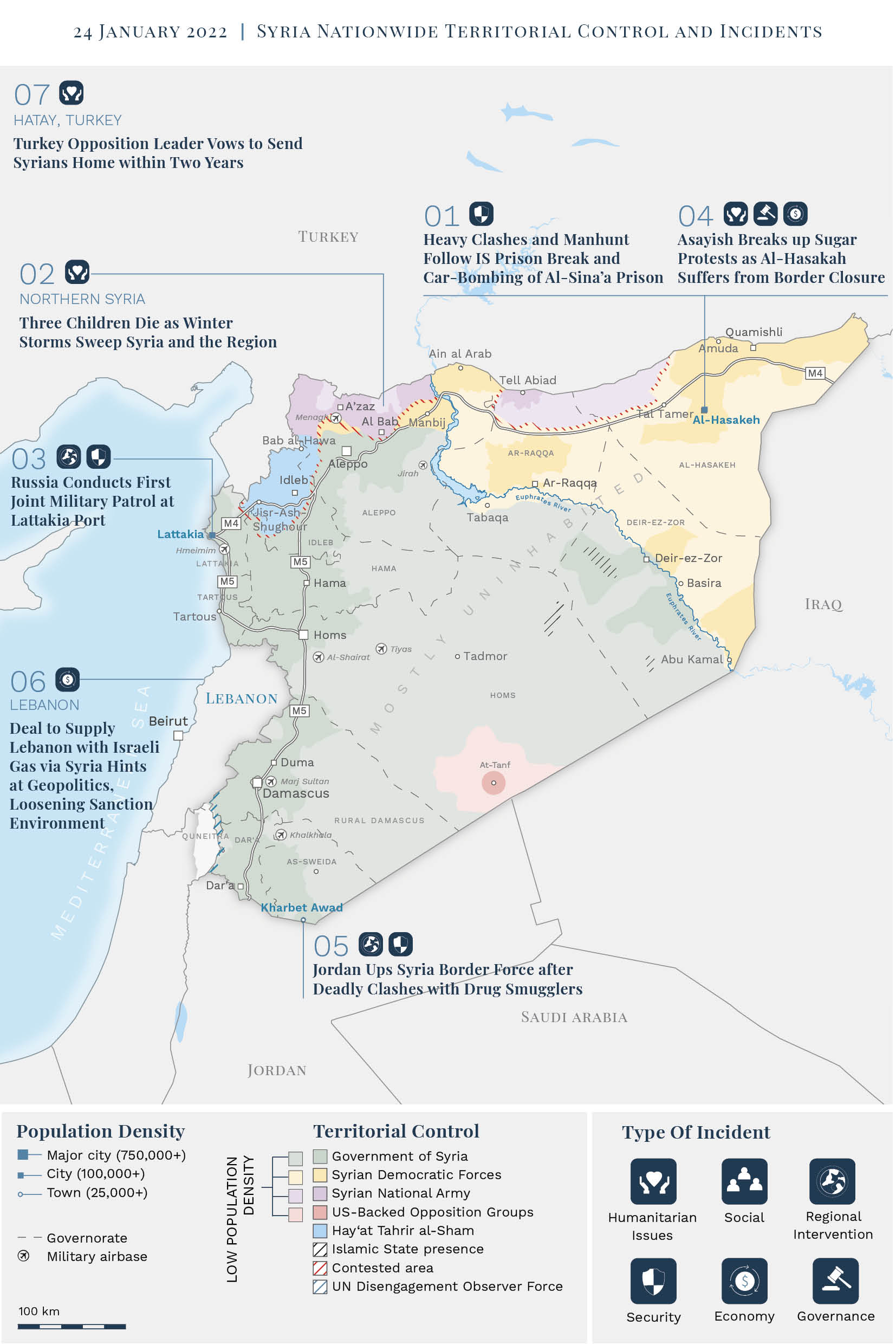
Heavy Clashes and Manhunt Follow IS Prison Break and Car-Bombing of Al-Sina’a Prison
On 20 January, Islamic State (IS) militants targeted Al-Sina’a prison in Al-Hasakeh city with two car bombs in an attempt to free IS prisoners. The incident was followed by armed clashes between IS fighters and the Syrian Democratic Forces (SDF). The latter closed roads leading to the prison amid intense fighting, with support from International Coalition helicopters over the area. Media sources reported that more than 20 IS fighters have escaped from the prison, which holds an estimated 5,000 IS fighters. The Government of Syria-appointed governor of Al-Hasakeh has stated that 3,000 residents have fled the area. Local authorities have requested that residents shelter at home as the SDF search for the escaped prisoners continues.
No fighting without fighters
The frequent plots to spring IS-linked inmates from Al-Sina’a prison reflect the group’s need for manpower. Most recently, in November 2021, the SDF and the US-led International Coalition thwarted a plot by a suspected IS cell in Deir-ez-Zor which had planned to attack the same prison (see: Syria Update 30 November 2021). Since its territorial defeat in 2019, IS has suffered diminishing manpower, as thousands of its fighters have either been killed or captured by the SDF. IS spokesperson Abu Hamza al-Qurashi addressed the issue in an October 2021 speech urging IS fighters in Iraq and Syria to destroy prisons and free their confederates. While the attack on Al-Sina’a prison is notable for its boldness, it is unlikely to significantly increase the IS’s operational capacity. However, it may raise the flagging spirits of IS affiliates, and embolden other actors who seek to challenge the SDF and Autonomous Administration.
Aid actors operating in northeast Syria should be aware that although the IS has suffered major setbacks, it has evidently retained capacity to stage large attacks. SDF prisons in northeast Syria house thousands of IS fighters from Syria, Iraq, Europe, and Asia. Every such incident draws attention to the issue of foreign fighters’ repatriation and prosecution. In the absence of local resources and capacity, such incidents prompt foreign governments to continue exploring options for their own nationals in SDF custody.
Three Children Die as Winter Storms Sweep Syria and the Region
Three children have died due to harsh winter conditions in northern Syria, according to media reports citing OCHA figures. On 19 January, OCHA reported that heavy snowfall in northwest Syria damaged 362 tents and affected 2,124 people in Aleppo and Idleb governorates. Syrian refugees and indigent Lebanese faced similar harsh conditions as a winter storm bore down on Lebanon from 18-20 January. Among the affected areas is the mountain community of Arsal, home to around 50,000 Syrian refugees, most of whom live in tents. Temperatures in Jordan, Lebanon, and Syria are expected to drop to 40-year lows, with CARE warning of 14-below-zero temperatures.
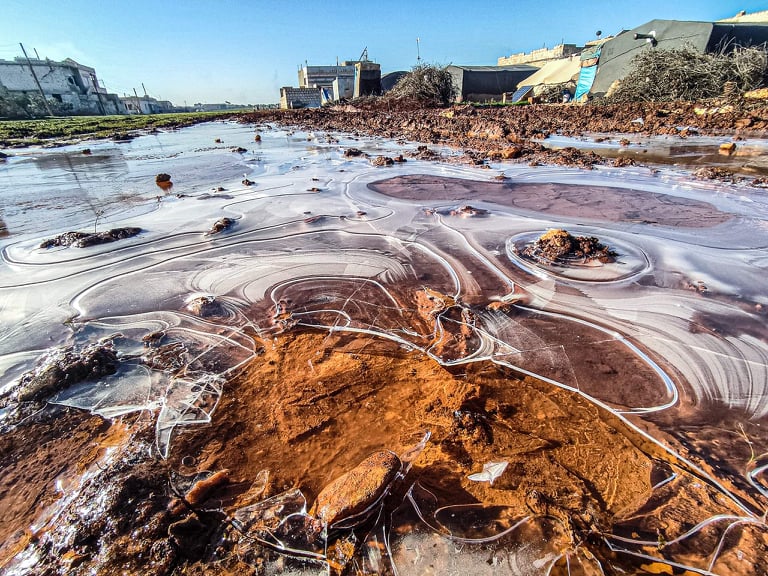
Winter has come, sustained support has not
Displaced Syrians face enormous challenges to shelter, mobility, access, and basic needs every winter. Many still live in tents and flimsy, make-shift shelters, particularly in northern Syria and rural Lebanon, where support for permanent structures is politically sensitive (see: Syria Update 4 January 2021) and seen as a move that will disincentivise eventual return (see: Syria in 2022: New Aid Approaches For an Evolving Crisis). Many camps were initially sited with little consideration for access, services, or sustainability, to say nothing of suitability for long-term habitation in a protracted crisis. Local NGOs have undertaken more robust shelter options in northern Syria, but few efforts of this kind have been pursued. Aid actors should understand that a failure to adequately explore durable solutions leaves these populations in perpetual limbo.
Russia Conducts First Joint Military Patrol at Lattakia Port
On 18 January, the Russian military police and Syrian Government forces conducted their first joint patrol at the port of Lattakia. Moscow has since deployed armoured military vehicles to the port, supported by drones. This comes after Israeli air strikes targeted the port last month (see: Syria Update 20 December 2021), allegedly targeting Iranian arms shipments to Tehran’s partners in Syria. In another sign of Russian interest in the port, on 17 January, Lattakia and Crimea port officials signed agreements to boost economic cooperation, according to TASS. Syrian Minister of Trade Mohammad Samer al-Khalil also visited Crimea to secure relations.
Russia calls the shots
Russia’s waxing presence at the Lattakia port has been justified on flimsy grounds, but it boosts Russia’s profile on the Syrian coast (having already established a naval base in Tartous in 2017), raises a deterrent to further Israeli attacks, and potentially edges out Iranian influence in the area. According to media sources close to Russia, the move followed the receipt of intelligence about threats of underwater sabotage planned by the Idleb-based opposition. These claims are difficult to verify, but no faction in Idleb, a landlocked pocket of largely mountainous territory dotted with fertile plains, is known to have an offensive maritime capacity. Lattakia is a hub of Assad regime-linked economic activities, including the export of narcotics (see: The Syrian Economy at War: Captagon, Hashish, and the Syrian Narco-State), though it is doubtful Russia will intervene to slow down this trade.
Asayish Breaks up Sugar Protests as Al-Hasakah Suffers from Border Closure
On 17 January, residents of Al-Salhiya neighbourhood in Al-Hasakeh gathered for a second day in front of the Autonomous Administration-affiliated Newroz Consumer Organisation, which is responsible for storing sugar in Al-Hasakeh Governorate, to protest an increase in prices and its monopoly over food commodities. The Internal Security Forces of the Autonomous Administration (Asayish) dispersed the protest after demonstrators smashed windows and destroyed security cameras while trying to storm the building. On 18 January, the Autonomous Administration announced an increase in the price of sugar from 2,400 to 2,800 SYP per kilogram, while the black market price in Al-Hasakeh has reportedly reached 8,000 SYP per kilogram.
Border battle
Autonomous Administration areas in northeast Syria are currently suffering from an acute shortage of commodities, including sugar, as well as a bread crisis (see: Syria Update 10 January 2022). The shortages follow the closure of the Fishkhabour-Semalka border crossing with Iraqi Kurdistan, the only transport outlet connecting northeast Syria to the outside world, which was shut down on 15 December 2021 following clashes between the youth wing of the Democratic Union Party (PYD) and Kurdistan Regional Government security forces. The closure has prevented the flow of commodities and humanitarian aid, as well as the movement of people, although some exemptions have been made. It has been reported that the border will reopen “soon.” The closure and resulting shortages have contributed to protests in Autonomous Administration areas, including in Ar-Raqqa Governorate, which have seen harsh crackdowns (see: Syria Update 17 January 2022). Dependence on a single border crossing highlights the precarious socio-economic dynamics of northeast Syria, which, despite its resource wealth, is vulnerable at a single point of failure. Aid actors should be keenly aware that access through the crossing can be shuttered with little warning and to dramatic effect.
Jordan Ups Syria Border Force after Deadly Clashes with Drug Smugglers
On 17 January, Major General Yusef al-Huniti, chairman of the Joint Chiefs of Staff of the Jordanian Armed Forces, announced a change in the rules of engagement on the northern and eastern border with Syria. The kingdom’s border presence will be strengthened by the Special Operation Forces and the Royal Air Force, and frequent contact zones will be elevated to a top priority. The shift follows recent clashes between the Jordanian military and smugglers on Jordan’s northeastern border, in which two Jordanian Army officers died and others were injured. Despite the frequency of such skirmishes, the killing of Jordanian military personnel is rare. On the same day, Jordanian Armed Forces announced that they had seized large quantities of narcotics, including around five million Captagon pills, on the Syrian-Jordan border in a single week.
The limits of normalisation
Amman’s security escalation reflects the issue’s salience for Jordan, but is unlikely to stop drug trafficking and smuggling via Syria, which has become a major resource for the wartime economy (see: The Syrian Economy at War: Captagon, Hashish, and the Syrian Narco-State). Smuggling has continued to increase despite Jordan’s pragmatic step to move closer to Damascus, thus fostering their shared economic and security interests, including border security (see: Syria Update 27 September 2021). In 2021 alone, 361 smuggling and infiltration attempts into Jordan through Syria have been filed, compared to 130 attempts in 2020. The fact that Damascus does not have the ability to curb drug trafficking, and has individuals and actors involved in trade, accounts for the gap in the level of security between Syria and Jordan. As the stalemate in the Syria conflict persists, cross-border smuggling will remain a challenge to Jordan.
Deal to Supply Lebanon with Israeli Gas via Syria Hints at Geopolitics, Loosening Sanction Environment
On 15 January, an Israeli TV report claimed that the US Special Envoy and Coordinator for International Energy Affairs, Amos Hochstein, had brokered a secret deal in which Israel would supply Lebanon with gas supplied via Jordan and Syria. The deal, one of many plans to provide an alternative to Iranian fuel in solving Lebanon’s energy crisis (see: Syria Update 20 September 2021), was reportedly coordinated by the US and Russia amid concerns over the growing strength of Hezbollah (and, by extension, Iran) in the country. However, the deal has not been officially confirmed. Lebanon’s Energy Ministry denied an agreement had been made with Israel and stated any natural gas through the Arab Gas Pipeline would come from Egypt (though Israeli gas reportedly already feeds into the pipeline, and it would be nearly impossible to exclude it from the supply that eventually reaches Lebanon). The Syrian section of the pipeline was announced ready for use in December 2021, and on 14 January, the US Treasury Department confirmed that gas transiting to Lebanon through Syria would not face sanctions.
One and done, or a new direction?
The deal speaks to the shifting prioritisation of US interests and objectives in the Levant and a continuing trend away from sanctions maximalism (see: Syria Update 15 November 2021). If reports of the brokered deal are confirmed, it would suggest that a collapsing Lebanon and a growth in Iranian influence is too great a price tag for the US policy of isolating the Government of Syria “at all costs”. While a far cry from ongoing processes of normalisation with the Government of Syria embarked upon by other Arab states (see: Syria in 2022: New Aid Approaches For an Evolving Crisis), it raises a question over the extent to which Western policies on engagement with Syria may shift and become subordinate to other geo-strategic priorities. The secret deal is perhaps recognition that attempts to exclude Iran from involvement in the Levant require more than diplomatic strong-arming; they require providing an alternative to its gas and gold. While the deal may be a one-off to avoid Lebanon’s disintegration, an outcome that nobody wants and would also have dire consequences for Syria, it is nonetheless another signal that maximalist (or indeed, over-broad) sanctions enforcement is no longer an overriding strategic priority for the US. Aid actors may benefit from the greater space that results.
Turkey Opposition Leader Vows to Send Syrians Home within Two Years
On 17 January, the leader of the Republican People’s Party (CHP) Kemal Kılçdaroğlu reiterated his party’s commitment to sending Syrian migrants back to Syria within two years if the CHP wins the 2023 presidential elections. Kılçdaroğlu stated that his party would ensure a safe and voluntary return for Syrians, but did not offer any concrete plan. According to the United Nations High Commissioner for Refugees (UNHCR), there are around 3.6 million Syrian refugees registered in Turkey, and an estimated 110,000 have obtained Turkish citizenship.
A return to what?
Such rhetoric is an important aspect of the popular appeal made by Turkey’s main opposition party, which has capitalised on mounting social animus toward Syrians and rising economic instability as it seeks a return to power. Syrians in Turkey have drawn attention to recent violent attacks and hate crimes, which some say are fuelled by such rhetoric. Many Syrians express uncertainty about their future in the country following the 2023 elections, with some worrying that their ability to remain in Turkey may be at risk. Donor governments should be sensitive to the delicate politics of refugee issues in Turkey, particularly as a change in political leadership may challenge the 2016 EU-Turkey agreement concerning migrants.
Key Readings
The Open Source Annex highlights key media reports, research, and primary documents that are not examined in the Syria Update. For a continuously updated collection of such records, searchable by geography, theme, and conflict actor, and curated to meet the needs of decision-makers, please see COAR’s comprehensive online search platform, Alexandrina, at the link below..
Note: These records are solely the responsibility of their creators. COAR does not necessarily endorse — or confirm — the viewpoints expressed by these sources.
Fatah builds bridges with Syria after rupture with Hamas
What does it say? Recent developments indicate that relations between Fatah and Syria are growing closer. Meanwhile, the Government of Syria continues to observe a policy of estrangement toward Hamas.
Reading between the lines: Fatah has maintained offices in Damascus since 2015. As such, the recent flurry of visits to Syria, pro-Syrian Government statements by Fatah officials, and the prospect of a visit by Mahmoud Abbas to Damascus do not indicate a dramatic change in policy.
Germany tries Syrian doctor for torture
What does it say? In the wake of the Raslan conviction, another Syrian Government affiliated figure, Dr Alaa Mousa, is now standing trial in Frankfurt, Germany, having been accused of torturing patients in Government hospitals.
Reading between the lines: Like Raslan’s conviction, the trial of Mousa indicates growing momentum for holding Syrian rights-violators outside of Syria accountable under the principle of universal jurisdiction. However, activists and commentators alike should temper their expectations in light of the limited opportunities to capture and try high-level offenders.
Syria, Crimea to develop trade exchange through Crimean ports
What does it say? Crimean ports could become Russia’s main sea gateway to develop trade and economic relations with Syria, providing a mechanism for the Syrian Government to mitigate the effects of Western sanctions.
Reading between the lines: The establishment of potentially lucrative economic linkages between Russia’s growing network of outposts in its ‘near abroad’ is one way in which Moscow can achieve a return-on-investment for its recent military adventurism in Ukraine, Syria, and elsewhere – and may reinforce the motivation to engage in more of the same.
Syria: ISIS threatens aid workers in Hol camp, media
What does it say? IS militants have been accused of killing civilians and aid workers in al-Hol camp.
Reading between the lines: IS violence in the lands of its former ‘caliphate’ is an ongoing danger; whether meaningful trends can be detected in such activity to indicate either potential resurgence or dwindling relevance is an open question.
China sends over 4,000 tons of rice to Syria as humanitarian aid
What does it say? The Government of Syria reportedly received over 4,000 tons of rice from China on 16 January, which the latter government dispatched under the aegis of humanitarian aid.
Reading between the lines: While China’s involvement in Syria is gaining increased attention, its relatively modest commitment of resources thus far does not show whether China is seriously ideating a significantly increased role in the country or simply seeking easy wins in the region.
What does it say? On 17 December 2021, members of the Revolutionary Youth organisation attacked the headquarters of the Kurdish National Council in the town of Darbasiyah following a ceremony celebrating Kurdistan Flag Day.
Reading between the lines: Alongside other threats, the Autonomous Administration must also contend with intra-Kurdish factionalism on a spectrum ranging from moderate pragmatists to hard-line nationalists which sometimes breaks out into open violence.
Iran, Saudi Arabia ‘preparing to reopen embassies,’ says Iranian lawmaker
What does it say? Six years after essentially cutting off relations, Saudi Arabia and Iran are reportedly in talks to reopen their embassies.
Reading between the lines: A Saudi-Iranian rapprochement would potentially reorder the Middle East under a new dispensation – one likely friendlier to Russia and China and more hostile to Western interests than at any time in recent history – and would go hand-in-hand with the reintegration of the Syrian Government into the regional community.
Iranian diplomats arrive in Saudi to take up Organisation of Islamic Cooperation posts
What does it say? Three Iranian diplomats arrived in Jeddah to work at the Organisation of Islamic Cooperation, against a backdrop of increasing indications of possible Saudi-Iranian rapprochement (see above).
Reading between the lines: As noted above, a warming of relations between the two regional powers would recognise facts on the ground after years of war in Syria and Yemen and lay the foundations for a new regional political order.
Financing for Protracted Displacement
What does it say? The article lays out recommendations based on new research for more durable solutions to protracted displacement.
Reading between the lines: Though active conflict in Syria has reduced significantly, those displaced outside of the country are unlikely to return. A shift to long-term, sustainable funding rather than immediate, humanitarian responses will be needed.
What does it say? Hezbollah and Iran-backed militias reportedly have been buying up land on the border between Lebanon and Syria.
Reading between the lines: It is difficult to ascertain whether land is being purchased or seized by militias or obtained by individuals with connections to such groups.




